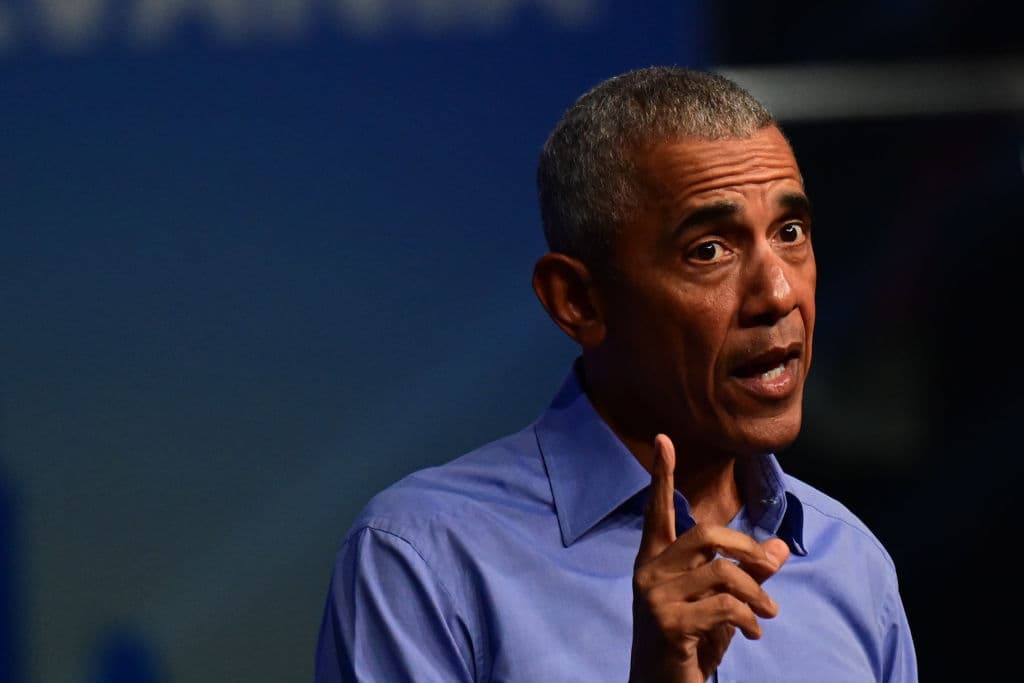Bingo. Why Do Democrats Feel It Unjust for Politicians To Validate America?
A philosophical rift emerges between our two leading parties.

Two leading African-American Democrats have in the last three weeks obligingly confirmed the cynicism of their party’s approach to core racial issues. President Obama was speaking in a podcast with the closest the contemporary Democratic Party has to the late dirty tricks activist, Saul Alinsky, David Axelrod, who was a political strategist for Mr. Obama for many years.
In response to a question of Mr. Axelrod’s designed to incite a rebuttal of racially optimistic opinions expressed by prominent minority Republicans, Mr. Obama said that the “hopeful message” delivered by the Republican African-American senator from South Carolina and candidate for the presidential nomination, Tim Scott, must be “undergirded with an honest accounting of our past and present… There’s a long history of African American or other minority candidates within the Republican Party who will validate America and say everything’s great and we can make it.”
Bingo. Yes, there are many people who would validate America, and there are a great many more who would ask — what is wrong with that? The validation of America is not a reprehensible or racially disrespectful act. Mr. Scott replied that “Barack Obama missed a softball moving at a slow speed with a big bat. Democrats deny our progress to protect their power. The left wants you to believe that faith in America is a fraud and progress in our nation is a myth.”
The former governor of South Carolina and ambassador to the United Nations, Nikki Haley, a partially Indian-American and another candidate for the Republican presidential nomination, whose racial perspective Mr. Obama disparaged, replied: “Barack Obama set minorities back by singling them out as victims rather than empowering them.”
These exchanges explained in a few words a fundamental distinction between the Republicans and the Democrats. The Democrats consider it unjust to “validate America.” Over his two terms as president, and since, Mr. Obama elaborated frequently on this theme: he criticized FDR and Churchill for conducting World War II in an “autocratic” manner, “brandy glasses in hand.” This subject need not here be explored at length: between 1940 and 1943 the entire future of Western civilization — any recognizable definition of human freedom — rested almost entirely on the shoulders of those two men.
Churchill’s genius at rapidly assembling a defense of the British home islands, winning the battle of Britain in the air and of the Atlantic against Nazi submarines, and in uplifting the morale of those who love freedom in every land by his inspiring Demosthenian addresses to the world, and Roosevelt’s extraordinary political virtuosity in leading an isolationist America to support the assistance that kept Britain and Canada in the war and then in leading the greatest single war effort of any nation in history to unconditional victory in Western Europe and the Far East, are not vulnerable to snide comments about “autocracy.”
Mr. Obama also criticized President Truman for using the atomic bomb to spare a million allied casualties and millions of Japanese in subduing Japan by conventional means, and after the Japanese had been warned of the development of a new weapon of unheard-of destructiveness.
He criticized President Eisenhower for his role in the removal of the Iranian leader, Mohammed Mossadegh, in 1953. Truman and Eisenhower were by any reasonable measurement much more distinguished presidents than Mr. Obama, and while they are not insusceptible to criticism, they are a much less vulnerable subject of it than he is himself.
The underlying theme of this criticism is that the Japanese and the Iranians were not white peoples and were therefore the subjects of racial discrimination. Of course, this is nonsense; Truman would have meted out the same measure against any people that had so treacherously attacked the United States; he was ending a war and not making a racial statement.
Eisenhower was joining the British in a geopolitical Cold War move to secure an important oil supply and put Iran in friendly hands. Eisenhower had no more sense of racial discrimination against Mossadegh than he did against the Shah of Iran who replaced him.
Implicit in the Republican view is pride that the United States has made a greater effort than any country in history to raise up a subjugated and servile, oppressed, population within its midst, not just by emancipation and integration, but to a place of equality. It was a long and horribly difficult process.
What Lincoln called “the bondsman’s 250 years of unrequited toil” was indeed only ended when “every drop of blood drawn by the lash (was) replaced by a drop of blood drawn by the sword.” One hundred years of reprehensible segregation followed, but President Lyndon Johnson spoke for the country when he said nearly sixty years ago that all Americans were the victims of racism and the whole nation “would overcome.”
The Biden nominee to the Supreme Court, an African-American, Justice Ketanji Brown Jackson, got in step with Mr. Obama in a dissenting opinion this past week in the Supreme Court’s rejection of affirmative action admissions policies at American universities. Her dissenting opinion sounded more like a partisan political screed. She accused her colleagues in the majority of “let-them-eat-cake obliviousness,” as if the justices had the blasé view of social inequalities folklorically attributed to Queen Marie Antoinette of France.
The only other African American on the High Court, Justice Clarence Thomas, took the unusual step of responding directly to her in a concurring opinion, which he read to the court: “Rather than focusing on individuals as individuals,” he said, Justice Jackson’s “dissent focuses on the historical subjugation of black Americans … to argue in favor of defining and categorizing individuals by their race.
As she sees things, we are all inexorably trapped in a fundamentally racist society, with the original sin of slavery and the historical subjugation of black Americans still determining our lives today … I strongly disagree.” Discrimination will not be defeated by counter-discrimination. America today is a racially enlightened country, not a permanently guilty country.
Justice Jackson has her own motives but there is no secret or question about the cynical motives of Mr. Obama and others who would never acquit America of the charge of racial injustice and claim the permanent right of the Democrats to be elected because of the evil of slavery.
He is the last person who should be wallowing in the sleazy Democratic vote-buying habit of pandering to the grievances of the minorities and the impressionable consciences of white America, instead of urging accelerated completion of what the whole country has “thus far so nobly advanced,” to quote Lincoln at Gettysburg.
Mr. Obama personifies the triumph over racial discrimination, but he sounds like the man who sat quiescently for 20 years in the church of the Reverend Jeremiah “God Damn America” Wright.

